NOTE: This is one of my favorite reviews I’ve ever written. It’s very long and discusses so many things, like the book does, so TL;DR… I highly encourage you to read this story. Even if religious books or “cancer books” aren’t your thing, I would be shocked to hear you didn’t enjoy it.
I received this book for free (hey, thanks!) in exchange for an honest review. I promise that this does NOT affect my opinion of the book or the content of my review. For real.
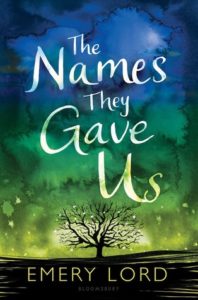 The Names They Gave Us by Emery Lord
The Names They Gave Us by Emery Lord on May 16th 2017
Also by this author: Open Road Summer, The Start of Me and You, When We Collided, Meet Cute: Some People Are Destined to Meet, Toil & Trouble: 15 Tales of Women & Witchcraft, The Map from Here to There, All That’s Left to Say
(400 pages) • Goodreads • Amazon • Barnes & Noble

Lucy Hansson was ready for a perfect summer with her boyfriend, working at her childhood Bible camp on the lake. But when her mom’s cancer reappears, Lucy falters—in faith, in love, and in her ability to cope. When her boyfriend “pauses” their relationship and her summer job switches to a different camp—one for troubled kids—Lucy isn’t sure how much more she can handle. Attempting to accept a new normal, Lucy slowly regains footing among her vibrant, diverse coworkers, Sundays with her mom, and a crush on a fellow counselor. But when long-hidden family secrets emerge, can Lucy set aside her problems and discover what grace really means?
Initial Excitement
Full disclosure: I don’t do well with books involving religion. I like reading books about various topics – especially about people who are not like me – but religious main characters are some I never click with. I’ve only read a few books involving main characters who are openly very religious and reference it, but they didn’t work. I knew I was going to read this book even though any summary involving the world “faith” (unless it’s about cults…) doesn’t make it on my TBR. I just can’t do them, but Emery Lord made me change my mind. I couldn’t not read a book by her. I was cautiously optimistic that she’d use her superb writing style to make me love a book about faith.
Quick Summary
… and, spoiler alert: she totally did. Lucy and her parents (her dad is a pastor and her mom has cancer) head to their church camp over each summer vacation. Because her mom’s cancer is back, she pushes Lucy out of her comfort zone and into a different camp on the other side of the lake. Its meant for healing and has kids dealing with various home or personal issues (illness, death, depression, etc.). Over the course of the summer, Lucy opens up to new experiences and people, all while exploring and questioning her faith.
All the Things
Lucy
I have to start with Lucy as a character, because this ties in the religious pieces as well. She starts the story with a bang – many references to religion right off the bat. I won’t lie, it’s uncomfortable for me to read a lot of the time. I was nervous about it. As the book goes on and she questions her faith, she opened up to other people and possibilities. The thing I love about Lucy is how open she is, compared to the stereotypical religious MCs I’ve read about. Her church and her parents have taught her about not judging people (or if there is a snap judgement, she is quick to think about it and correct herself right away). Many religious main characters start out very judgmental and then grow away from that throughout the story. It can be incredibly difficult to read at first. Lucy was open to all people and their situations. She had a shock when she saw a pregnant teen at the camp, but immediately remembered things she’d learned from her parents and reserved her judgement. I loved reading her reactions to other things that may have made her uncomfortable. I actually ended up loving the parts about her faith. She references God, is uncomfortable when people use his name as a curse word, and doesn’t often swear herself. She’s a genuinely good person who takes an extra moment to pause and think of how someone else might feel about something. It was truly wonderful to be in her head, and I don’t know how else I can describe it!
Parents
Her relationship with her parents was one of the best I’ve read in fiction. She realized early in her teen years that time with parents is precious. This mostly came about because of her mom’s first bout with cancer, but she developed a greater appreciation and respect for them afterwards. I loved reading about their traditions and learning so many small details about her mom that she’d come to appreciate over time. I really felt like a member of their family. Even when she was angry with them, she took a few minutes to compose herself. They had open and honest conversations about basically everything, even when she was frustrated or concerned. Just truly some of the best character-building for family members I’ve read.
Camp and friends
Moving into the characters at the camp and the story itself… This really was a book about Lucy’s journey as a person, and the different people she met and connected with. The camp was for kids who have some kind of family or health-related issues, like death, serious illness, depression, adoption/foster care… seriously anything. It was a supportive environment for those campers (and counselors) but never felt like a camp for “sad kids” in any way. It was a nice mix of camp activities and connecting with kids about loss and more. The group of counselors she grows close with include people who were campers back in the day and have developed incredibly close bonds. Lucy doesn’t have a very close group of friends at some – except for the swim team – and starts the story feeling like an outsider compared to their little bubble. They all have history with each other. They are an incredibly welcoming group of people. Lucy was embraced by them easily, and they helped her learn about herself and friendship. Their support (especially later on in the story) was unbelievable; she is truly lucky. (I’m talking about this people like they exist, obviously, because they totally felt real to me.) I’ll talk more about the different backgrounds and types of diversity involved in a later section, but just know that this friend group offered up people from all walks of life.
Romance
Oh man. The romance. The book begins with Lucy dating someone from home, and then going on a “pause for the summer.” It was a lame way to essentially break up. (This gets resolved later on, but note that it doesn’t feel like a love triangle and I don’t think it is one in any way.) When Lucy starts getting close to another counselor (I guess this isn’t a spoiler but I’ll leave his name out just in case), major feelings develop and they learn more about each other over the course of the summer. I loved reading their funny conversations and feeling all the new-crush-jitters radiating off of her. The romance wasn’t at the forefront of the novel, but it was a great catalyst for growth and I loved every single moment of it. Also, have to say it, interracial relationship!
Faith, diversity, and more
This is a story about growing up. It’s about changing. It’s about getting used to change. It’s about learning who you are as a person, who your friends are, what your parents mean to you, and about love. I ended up seriously enjoying the parts of the book involving faith, which I didn’t expect at all. Lucy’s questioning of God and her religion happened somewhat quietly throughout the story, but faith still guided her throughout the story. I think it’s such an important, missing piece of some YA fiction books. I don’t personally reach for these stories (thank you Emery Lord for maybe changing my mind on that), but I know countless of kids may want to see religion in books. Diversity is a necessary, important part of writing stories… especially for young adults. This book had SO many different kinds of diversity. We’re talking about kids and adults from every single background, with many religions or beliefs, and with all kinds of sexuality across the spectrum. Just off the top of my head, the following things are explored: depression, anxiety, grief, foster care, faith/religion, adoption, transgender, bisexuality, cancer, abuse, teen pregnancy, race/ethnicity… and probably more I’m forgetting. The representation in this book was wonderfully, and developed enough where it didn’t feel like she was just tossing in people to represent certain aspects of diversity.
Ending Feels
The “long-hidden family secrets” thing mentioned in the last paragraph of the book’s synopsis truly doesn’t happen until the VERY END of the story. It felt somewhat abrupt and not explored as well as it could have been. Maybe that will change in the finished copy? I kept getting close to the final page number and getting worried about unresolved things. I don’t want to spoil how it ends, or even if certain things get resolved, but this is my one maybe-qualm with the book. I liked how it ended, in some ways, but I disliked it in others. Do I think it was an appropriate ending for the book? Yes, I think I do. I explained it to my boyfriend afterward and I said my main issue, and his response was: “well, maybe that wasn’t the point.” And I think he’s right. The book is about Lucy, her growth, her faith, and her future. I’ll leave it at that.
Bookmarked It
I bookmarked a LOT of passages in this one. I don’t think any are spoilery (or even at the end of the book), but I will include one of my favorites here. It shocks me that I could bookmark a quote about faith, but this resonated with me… {Please note this is from an advanced copy and may change in the published version!}
I stand before the wall of faith, a line of talismans representing so much more.
And I say a final last prayer, this one in gratitude that there are people in the world who will protect kids with a fire that makes them sprint after cars, fight systems, curse with rage.
It’s enough to make you believe.
Maybe not in symbols; maybe not in gods. But certainly in people.
TL;DR?
In case you couldn’t tell, I loved everything about this story. I thought about it nonstop when I wasn’t reading and wanted to do nothing more than read it. I could have crawled inside this setting and hung out with these characters forever, well beyond these pages. If you’re a fan of coming-of-age stories focused on character development, plus diversity and romance and faith and family and friendship? You should probably read this book. I can’t imagine someone not finding an aspect to relate to or enjoy about this. I was proven wrong; not all religious books feature characters who judge too quickly or refuse to grow with society. All of those stereotypes I’d seen in the past were busted. I sincerely hope you read it and love it too.
Thoughts in a Gif

Rating Breakdown
| Plot & Premise | |
| Characters | |
| Writing Style | |
| Pacing & Flow | |
| Feels or Swoons | |
| Addiction Level | |
| Overall: | 4.8 |
Infographic
The app, Bookout, allows you to track your reading and share fun statistics after you finish the story. I’ll be using it to track stats for all of my physical copies I read this year. Here’s this one’s:




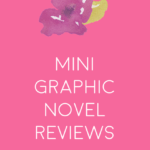


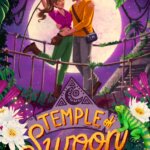




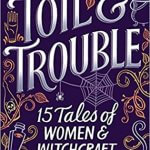


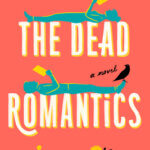


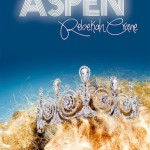



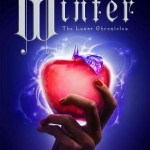
Wow this book sounds amazing! I am so glad that you loved it 🙂 This review had definitely made me more curious about reading it, so thanks for sharing 😀
Brittany @ Brittany’s Book Rambles
Awesome! I hope you love it 🙂
Such a wonderful review, Lauren! You organized it so well– mine is going up tomorrow and is a mess of feelings and thoughts and pleas for everyone to read this book, haha. I just… how does Emery Lord do it?
Lucy’s journey was so beautifully explored. Every character felt so real. Oh, and I completely agree about the ending, by the way!
Haha right?! It’s AMAZING. I don’t know how she writes so well <333
Thank you SO much for sharing your ARC with me, I’m totally right there with you, this book was EVERYTHING and my review is just non-stop rambling hahaha